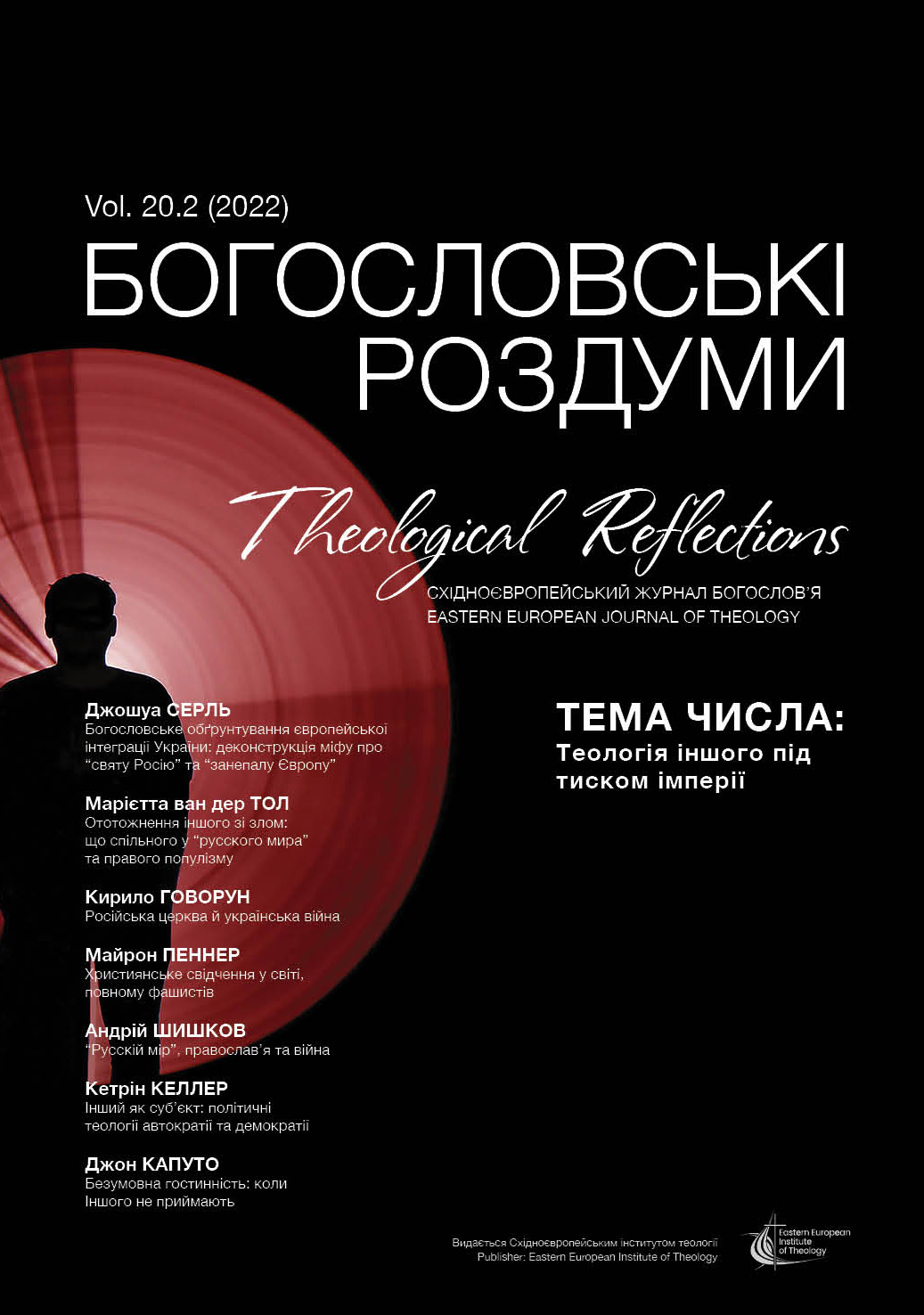Unconditional Hospitality – When the Other is not Welcome
DOI:
https://doi.org/10.29357/2789-1577.2022.20.2.7Keywords:
the unconditional, hospitality, event, deconstruction, democracy, Jacques DerridaAbstract
Derrida’s notion of unconditional hospitality appears to be an invitation to disaster. He seems to say that we should always and everywhere welcome the other into our own, into our home or our land, “without condition,” no questions asked, even if they mean to do us harm. But surely we have the right to insist that the other is welcome only under the condition of having no ill intentions. So it seems, contra Derrida, that hospitality only makes sense if it is conditional while unconditional hospitality is inviting trouble. So the question for us today is this, How can the notion of unconditional hospitality – or forgiveness – be maintained in the face of such perfectly obviously objections? A cautionary note: Derrida takes up the question of hospitality from the point of view of the refugee, the displaced, the exile, the immigrant, in short, of those who are in need of our hospitality. He was not discussing the right to self-defense when we come under attack by the other, when the other poses a clear and present threat. So we are raising this question in a different context and we will need to draw out the implications of what he is saying for our own purposes today.
References
- Derrida, Jacques. Negotiations: Interventions and Interviews: 1971-2001. Trans. Elizabeth Rottenberg. Stanford: Stanford University Press, 2002.
- Derrida, Jacques. Writing and Difference, trans. Alan Bass. Chicago: University of Chicago Press, 1978.
- Kearney, Richard and John Caputo. God, the Gift and Postmodernism. Eds. John D. Caputo and Michael J. Scanlon. Bloomington: Indiana University Press, 1999.
- Derrida, Jacques. Paper Machine. Trans. Rachel Bowlby. Stanford: Stanford University Press, 2005.
- Derrida, Jacques. Rogues: Two Essays on Reason. Trans. Pascale-Anne Brault and Michael Naas. Stanford: Stanford University Press, 2005.
- Derrida, Jacques. “To Forgive,” in Questioning God, eds. John D. Caputo, Mark Dooley, and Michael J. Scanlon. Bloomington: Indiana University Press, 2001.
- Derrida, Jacques. Given Time, I: Counterfeit Money. Trans. Peggy Kamuf. Chicago: University of Chicago Press, 1991.
- Derrida, Jacques. “The Force of Law: ‘The Mystical Foundation of Authority.’” Trans. Mary Quantaince, in Acts of Religion, ed. Gil Anidjar. New York and London: Routledge, 2002.
- Caputo, John D. “Too Good to be True,” More Radical Hermeneutics. Bloomington, IN: Indiana University Press, 2000.
- Derrida, Jacques. Of Grammatology. Corrected edition, trans. Gayatri Spivak Baltimore: Johns Hopkins University Press, 1997.
- Derrida, Jacques. The Gift of Death. Trans. David Wills. Chicago: University of Chicago Press, 1995.
- Derrida, Jacques. The Beast and the Sovereign. Seminars, Volume 1. Trans. Geoffrey Bennington. Chicago: University of Chicago Press, 2019.
Downloads
Published
How to Cite
Issue
Section
License
Copyright (c) 2023 John Caputo

This work is licensed under a Creative Commons Attribution-NonCommercial 4.0 International License.
All articles published in the Journal are distributed under a Creative Commons Attribution-NonCommercial 4.0 International License
By submitting an article for publication in Theological Reflections: Eastern European Journal of Theology the author grants the editors the right to publish the article and distribute it in electronic and print form.
The author reserves all copyrights and the right to use the materials of the article in whole or in part for educational purposes, to write his own dissertations, to prepare abstracts, conference reports, oral presentations, etc., as well as post electronic copies of articles (including the final electronic version downloaded from the journal’s official website) on non-commercial web-resources without the consent of the editorial board and founders.



